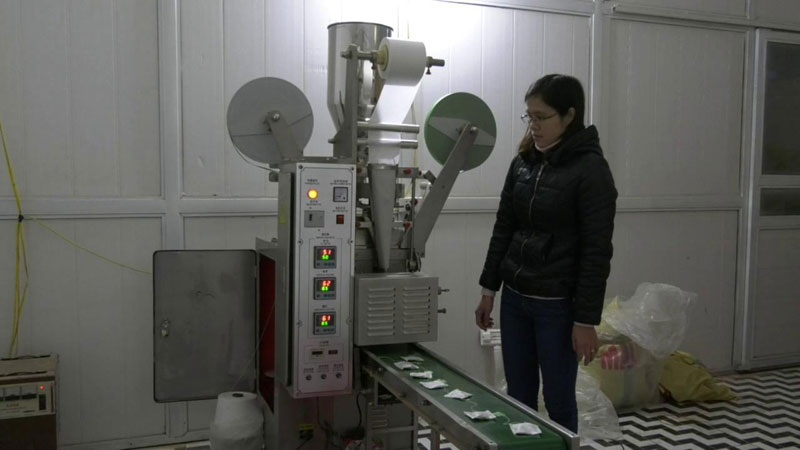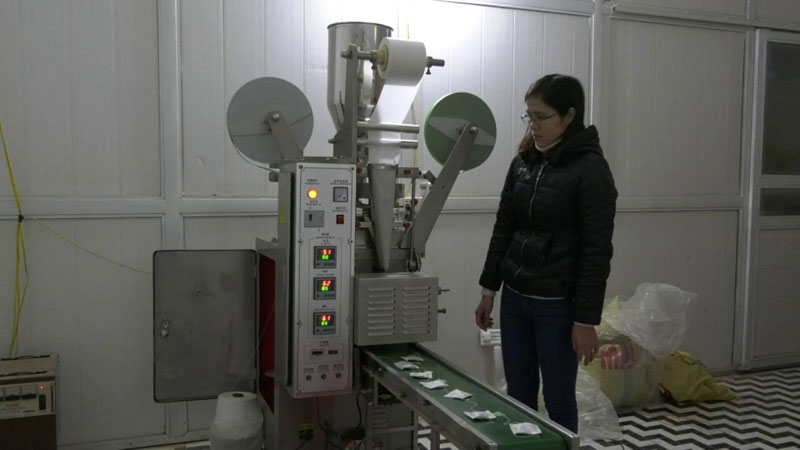
(HBO) – Born into a farming family, Nguyen Thuy Linh, in Yen Thuy district, soon recognised potential and strength of the locality in planting and preserving precious medicinal herbs, including ca gai leo (scientifically known as Solanum procumbens).

Nguyen
Thuy Linh and her production chain of Solanum procumbens tea.
Solanum
procumbens has been planted in Yen Thuy since 2015 under the second phase of a
poverty reduction project. To meet the increasing demand of the market, in
August 2016, Thuy decided to open a Solanum procumbens tea production facility.
At first, she
produced tea only on office-off days. However, with limited capital investment
and experience, she had met a range of difficulties.
"On the first
days, I went to office in the daytime and read documents on Solanum procumbens
as well as business strategy at night. During weekends, I directly worked with
employees at the facility,” she said.
Her efforts paid
off as in 2017, Linh was eligible to get loans for her start-up project,
allowing her to expand production.
She now owns a
Solanum procumbens tea production facility in Yen Son hamlet, Yen Lac commune,
Yen Thuy district, covering 120 sq.m. Linh signed contracts with local farmers
to plant Solanum procumbens in line with Good Agricultural and Collection
Practices (GACP) standards. She has introduced Binh An Solanum procumbens tea
to the market. With the mixture of Solanum procumbens and Celastrus hindsii and
sweetleaves, Binh An tea has beneficial effects in the prevention and treatment
of high liver enzymes, B and C hepatitis viruses, urticaria, acne, indigestion,
and especially diabetes.
Sweetleaves’
glycoside compounds are 300 times sweeter than sucrose (ordinary table
sugar), thus helping prevent high liver enzymes. Produced from medicinal
plants, Solanum procumbens tea is safe for users.
Linh’s tea
production facility is operating with specialised machines and three workers,
each earning an average of 3-5 million VND monthly.
The product has
been sold in many cities and provinces nationwide like Lao Cai, Yen Bai, Ho Chi
Minh City, Buon Me Thuot, Hoa Binh, Ha Noi, Ninh Binh and Bac Giang, receiving
positive response from customers.
Linh said she
plans to expand tea production to 1ha in order to meet the market’s huge
demand. Apart from purchasing more machines, she will develop a model of
preserving precious medicinal herbs on an area of 6,000 sq.m, at a total cost
of about 5 billion VND.
According to data from the Hoa Binh Provincial Party Committee, the industrial production index for the first six months of 2025 is estimated to have increased by 20% compared to the same period last year. This marks the highest year-on-year growth rate for this period since 2020.
In the first six months of 2025, Hoa Binh province’s export turnover was estimated at 1.145 billion USD, marking an 18.11% increase compared to the same period in 2024. Import turnover was estimated at $ 804 million, a 17.15% increase, which helped the province maintain a positive trade balance.
The lives of the ethnic minority farmers in Tan Lac district have gradually improved thanks to the new directions in agricultural production. This is a testament to the collective strength fostered through the professional associations and groups implemented by various levels of the district’s Farmers’ Union.
With the motto the "product quality comes first,” after nearly one year of establishment and operation, Muong village’s Clean Food Agricultural and Commercial Cooperative, located in Cau Hamlet, Hung Son Commune (Kim Boi district), has launched reputable, high-quality agricultural products to the market that are well-received by consumers. The products such as Muong village’s pork sausage, salt-cured chicken, and salt-cured pork hocks have gradually carved out a place in the market and they are on the path to obtaining the OCOP certification.
In the past, the phrase "bumper harvest, rock-bottom prices" was a familiar refrain for Vietnamese farmers engaged in fragmented, small-scale agriculture. But today, a new spirit is emerging across rural areas of Hoa Binh province - one of collaboration, organisation, and collective economic models that provide a stable foundation for production.
Maintaining growing area codes and packing facility codes in accordance with regulations is a mandatory requirement for agricultural products to be eligible for export. Recently, the Department of Agriculture and Environment of Hoa Binh province has intensified technical supervision of designated farming areas and packing facilities to safeguard the "green passport" that enables its products to access international markets.



